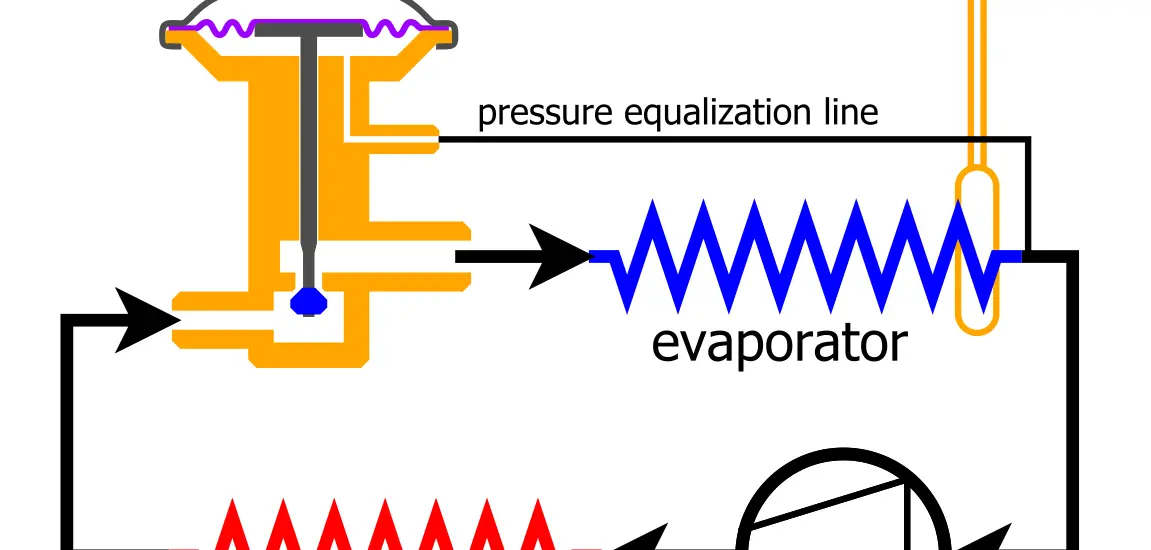In HVAC systems, encountering “ice after expansion valve” can indeed be a signal indicating an underlying issue. This guide will reveal what happens when ice forms after the expansion valve and how you can address it adequately.

Table of Contents
What Causes the Formation of Ice After Expansion Valve
The phenomenon of ice forming after the expansion valve can be puzzling, especially if you are not familiar with how HVAC systems work. This occurrence is not just a simple glitch; it indicates deeper issues in your system. Let’s understand each cause.
Excess Moisture
The presence of moisture in the system can be a primary cause. When moisture infiltrates the system, it can freeze at the expansion valve, creating a blockage.
This is because the valve is a point where the refrigerant’s temperature and pressure drop significantly, providing an ideal environment for ice to form. It’s akin to how water pipes can freeze in extremely cold weather.
Malfunctioning Expansion Valve
A valve that is not working correctly can either allow too much or too little refrigerant to pass through. This imbalance can lead to irregularities in the system’s temperature, leading to ice formation.
Think of it as a shower with fluctuating water temperatures, where it suddenly goes from hot to cold; a similar fluctuation happens here but with refrigerant instead of water.
Low Refrigerant Levels
Just as a car needs enough oil to run smoothly, your HVAC system needs an adequate amount of refrigerant. When the levels are low, it leads to a decrease in pressure, which can further drop the temperature to a point where moisture in the system freezes, resulting in ice formation at the valve.
Armed with knowledge about the potential causes, let’s move forward to learn the preventative measures that can be taken to avoid this issue.
Steps to Prevent Ice Formation
Preventing the formation of ice after the expansion valve is vital in maintaining the longevity and efficiency of your HVAC system. Let’s break down the steps you can take to avoid encountering this problem:
Regular Maintenance: Just like you would service your car to keep it running smoothly, your HVAC system also requires regular check-ups. It helps in identifying potential problems early on and taking corrective actions before they escalate.
Proper Insulation: Ensuring that your system is properly insulated will prevent external moisture from getting in and condensing, which is a precursor to ice formation. Think of insulation as a protective blanket that keeps unwanted elements out.
Address Leaks: Over time, wear and tear can lead to leaks in the system. Finding and fixing these promptly will prevent a reduction in pressure that facilitates ice formation. It’s similar to mending a leak in a water pipe to prevent water loss.
Valve Inspection: Keeping a close eye on the expansion valve is crucial. Regular inspections can help identify issues before they turn into major problems, ensuring the valve regulates refrigerant flow optimally to prevent icing conditions.
Check out these other related articles…
How to Check Superheat on TXV: Your Step-by-Step Guide
TXV Hunting: Your Comprehensive Guide
Electronic Expansion Valve Types: The Full Breakdown
TXV Superheat or Subcooling: A Comprehensive 411 Comparison
Constant Pressure Expansion Valve: Comprehensive 411 Guide
Professional Tips for Maintenance
Prevention is the cornerstone of maintaining a healthy HVAC system. However, some tasks are best left to professionals who have the expertise and tools to diagnose and remedy issues accurately. Let’s discuss what professionals bring to the table:
Expert Analysis: A trained eye can spot issues that an untrained individual might miss. Professionals can analyze the system holistically, considering all potential factors that could lead to ice formation.
Advanced Tools: Professionals come equipped with advanced tools that can detect issues swiftly and accurately, enabling them to address problems with precision.
Expert Advice: Besides fixing existing issues, professionals can offer advice on how to maintain the system effectively. They can suggest measures like installing a dehumidifier to control moisture levels or recommending specific insulation materials.
By adhering to these tips and seeking professional help when needed, you can ensure a long and healthy life for your HVAC system.